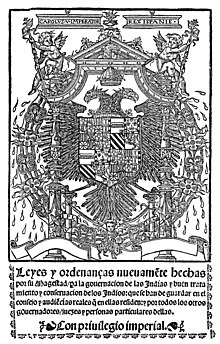Leyes Nuevas
The Leyes Nuevas ( New Laws ) are part of Indian law .
prehistory
Shortly after the discovery of America in 1492 , the Castilian crown was informed by the monks of the Dominican order about the grievances from which the indigenous population in the colonies had to suffer. Thereupon Queen Joan of Castile, represented by her father Ferdinand II, ordered the so-called Leyes de Burgos to be observed, which were adopted on January 27, 1512. But the slave trade was continued by the conquistadors .
The Dominican Bartolomé de Las Casas was one of the first and most important people to oppose the brutal and inhuman enslavement of the Indians in the colonies . In 1516 he succeeded in setting up a commission of inquiry in Haiti , which, however, was corrupted on site.
Enactment and consequences
De Las Casas initiated a debate about the treatment of the Indians, which prompted the Spanish king to set up an examination commission that should bring about a solution to the grievances. In 1542 this commission presented the so-called Leyes Nuevas ( New Laws ), which placed the Indians under the protection of the Spanish crown. On November 20, 1542, the laws of Emperor Charles V were promulgated in Barcelona.
In particular, the prohibition of enslavement of the Indians and the prohibition against waging war against them met with strong opposition from the Spanish settlers in the colonies. It was rumored, among other things, that rebellions against the king had broken out because of the laws in Mexico, Chiapa, Honduras and Peru. In the New World, the New Laws were practically not applied. Blasco Núñez de Vela was one of the few who tried to enforce it by force if necessary.
On October 20, 1545, the most important of the New Laws was finally repealed by the Emperor, namely the one that prohibited the reallocation of Indians.
literature
- Martin Neumann: Las Casas. The incredible story of the discovery of the New World . Herder, Freiburg / B. 1990, ISBN 3-451-22066-0 .
Individual evidence
- ^ Martin Neumann: Las Casas. The Incredible Story of the Discovery of the New World , pp. 177–186.
- ^ Martin Neumann: Las Casas. The Incredible Story of the Discovery of the New World , p. 197.
- ^ Martin Neumann: Las Casas. The incredible story of the discovery of the New World , pp. 210f.
- ^ Martin Neumann: Las Casas. The Incredible Story of the Discovery of the New World , p. 209.

